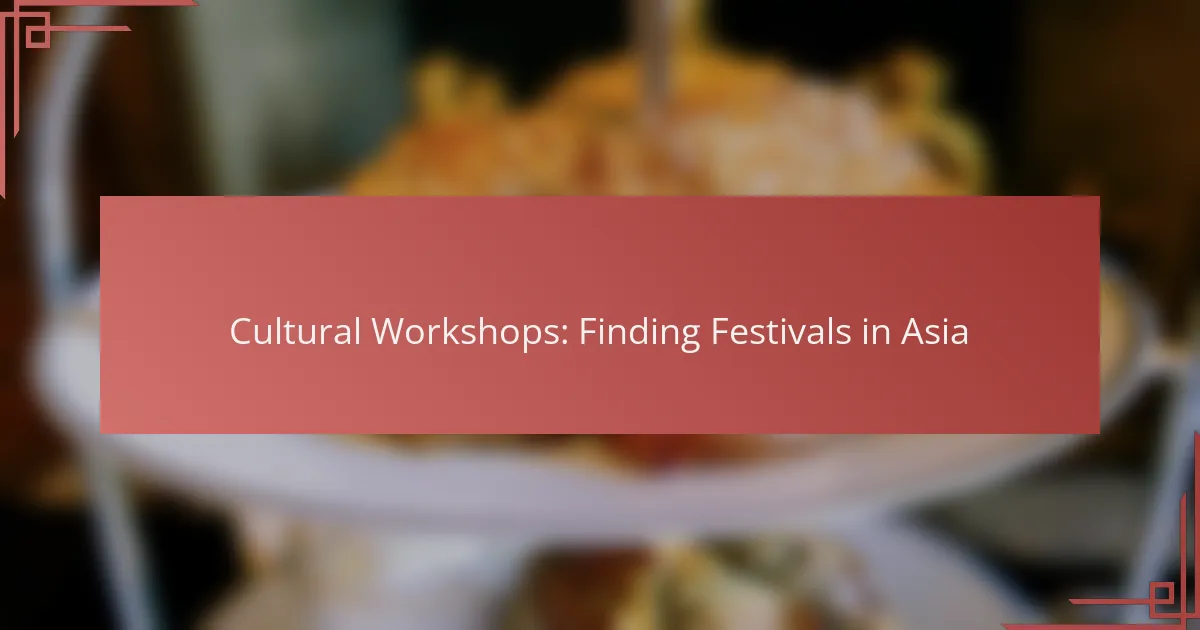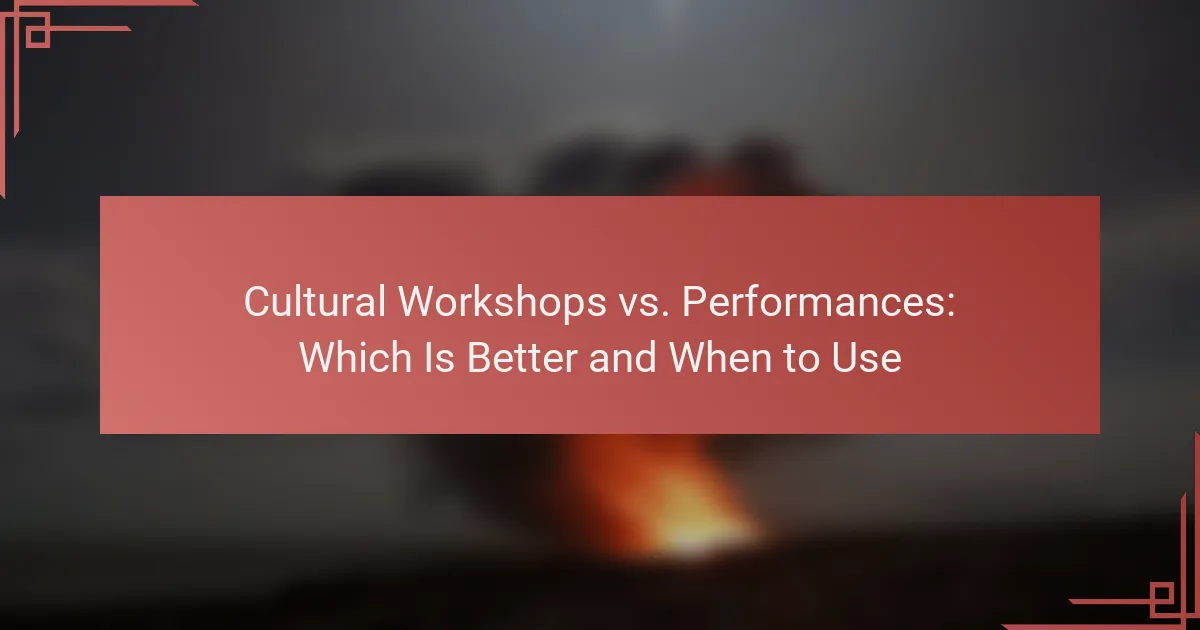Asia is home to a plethora of vibrant cultural festivals that celebrate its rich traditions and diverse heritage, such as Diwali in India and Songkran in Thailand. By finding cultural workshops during these festivals, travelers can significantly enhance their experiences, gaining valuable skills and insights into local customs. Utilizing online platforms, local tourism boards, and social media can help uncover these enriching opportunities.
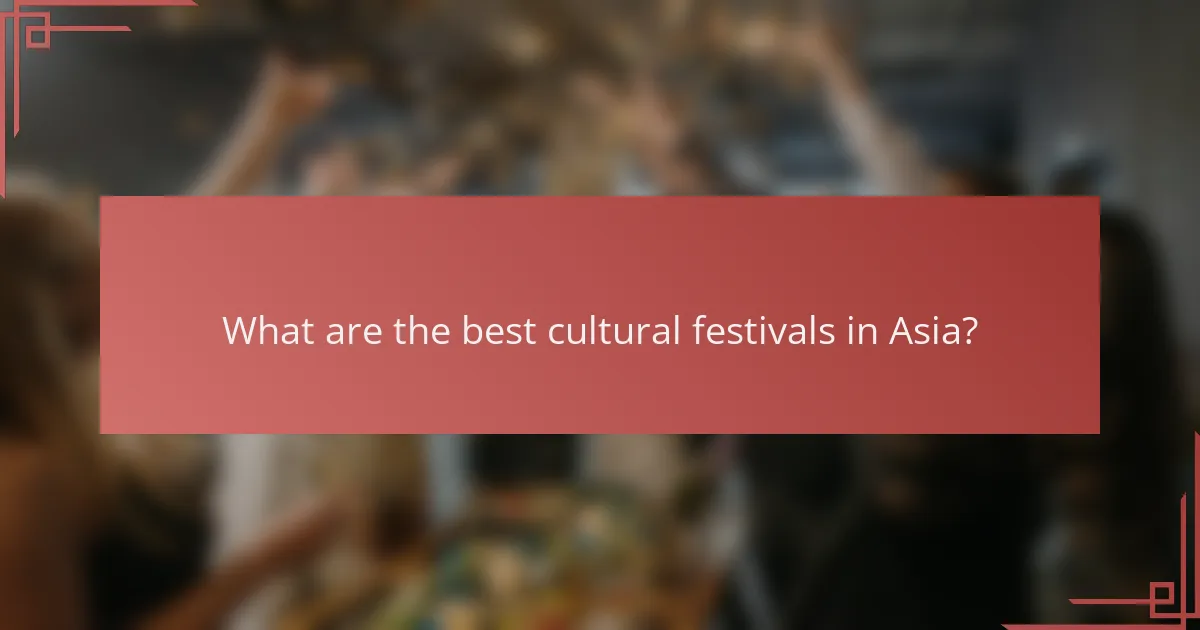
What are the best cultural festivals in Asia?
Asia hosts a variety of vibrant cultural festivals that showcase its rich traditions and diverse heritage. Some of the most celebrated festivals include Diwali in India, Songkran in Thailand, Chinese New Year in China, Holi in India, and Gion Matsuri in Japan.
Diwali in India
Diwali, known as the Festival of Lights, is celebrated by millions across India and the world. It typically occurs in October or November and symbolizes the victory of light over darkness and good over evil.
During Diwali, families decorate their homes with oil lamps, candles, and colorful rangoli designs. Fireworks light up the night sky, and people exchange gifts and sweets, creating a festive atmosphere. Visitors should consider participating in local customs and enjoying traditional foods to fully experience this celebration.
Songkran in Thailand
Songkran marks the Thai New Year and is celebrated in mid-April. This festival is famous for its water fights, where people splash water on each other as a symbol of cleansing and renewal.
During Songkran, cities like Bangkok and Chiang Mai come alive with parades, traditional ceremonies, and street parties. Travelers should dress appropriately and be prepared to get wet, as water is a central theme of the festivities. It’s also a good idea to respect local customs, especially when visiting temples during this time.
Chinese New Year in China
Chinese New Year, also known as Spring Festival, is the most important celebration in China, occurring between late January and mid-February. It marks the beginning of the lunar new year and is celebrated with various customs and traditions.
Festivities include family reunions, feasting on traditional dishes, and giving red envelopes filled with money for good luck. Fireworks and lion dances are common sights during this period. Visitors should be aware that travel can be hectic during this time, so planning ahead is essential.
Holi in India
Holi, the Festival of Colors, is celebrated in March and signifies the arrival of spring. It is a joyous occasion where people throw colored powders and water at each other, symbolizing love and unity.
During Holi, communities come together to celebrate with music, dance, and festive foods. Travelers should embrace the spirit of the festival by participating in the color play but should also take care to protect their skin and eyes from the powders used.
Gion Matsuri in Japan
Gion Matsuri is one of Japan’s most famous festivals, held in July in Kyoto. It originated in the 9th century as a purification ritual to appease the gods and has evolved into a month-long celebration.
The highlight of Gion Matsuri is the grand parade featuring elaborately decorated floats called yamaboko. Visitors can enjoy traditional music, food stalls, and cultural performances throughout the festival. It’s advisable to check the schedule for specific events and plan accommodations early, as the festival attracts many tourists.
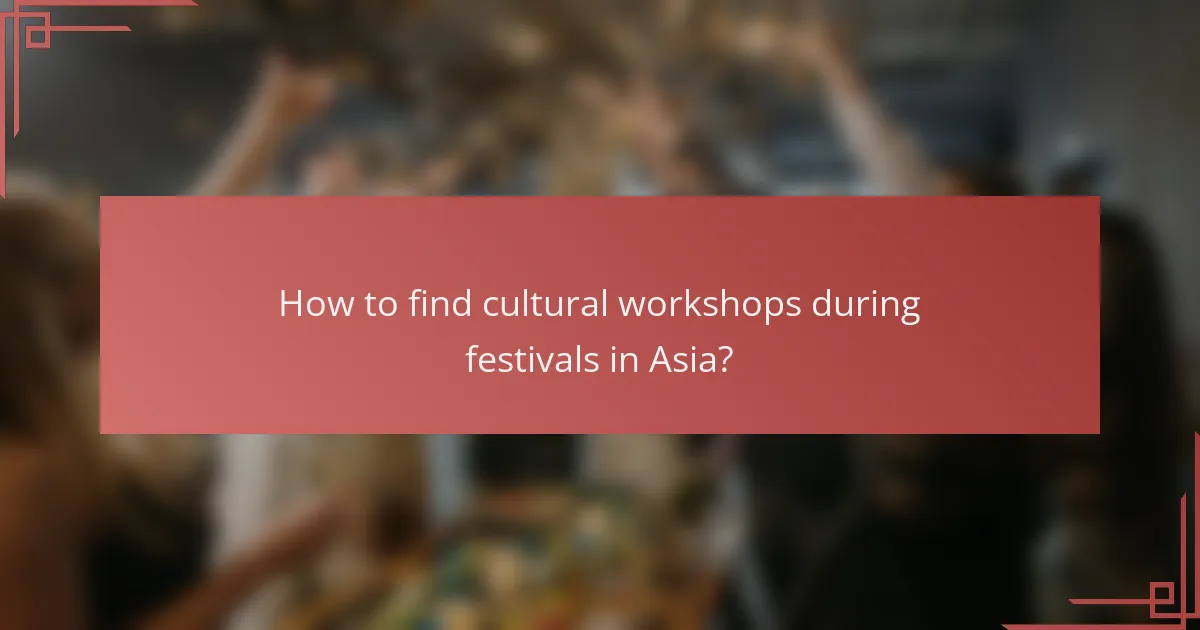
How to find cultural workshops during festivals in Asia?
Finding cultural workshops during festivals in Asia can enhance your travel experience significantly. Utilize various resources such as online platforms, local tourism boards, and social media to discover these enriching opportunities.
Online platforms like Eventbrite
Online platforms like Eventbrite are excellent for discovering cultural workshops tied to festivals in Asia. You can filter events by location, date, and category, making it easy to find workshops that fit your schedule and interests.
When using these platforms, consider subscribing to alerts for specific festivals or regions. This way, you can receive notifications about new workshops as they are added, ensuring you don’t miss out on unique experiences.
Local tourism boards
Local tourism boards are valuable resources for finding cultural workshops during festivals. They often provide comprehensive information about upcoming events, including workshops, performances, and other cultural activities.
Visit the official websites or physical offices of tourism boards in the area you plan to visit. They may offer brochures, maps, and personal recommendations that can help you navigate the local cultural scene effectively.
Social media event pages
Social media event pages are a dynamic way to find cultural workshops during festivals. Platforms like Facebook and Instagram often feature event listings and allow users to RSVP, providing a sense of community around the workshops.
Join local groups or follow pages dedicated to cultural events in the region. Engaging with these communities can provide insider tips and updates on last-minute workshops or changes in scheduling, ensuring you stay informed and connected.
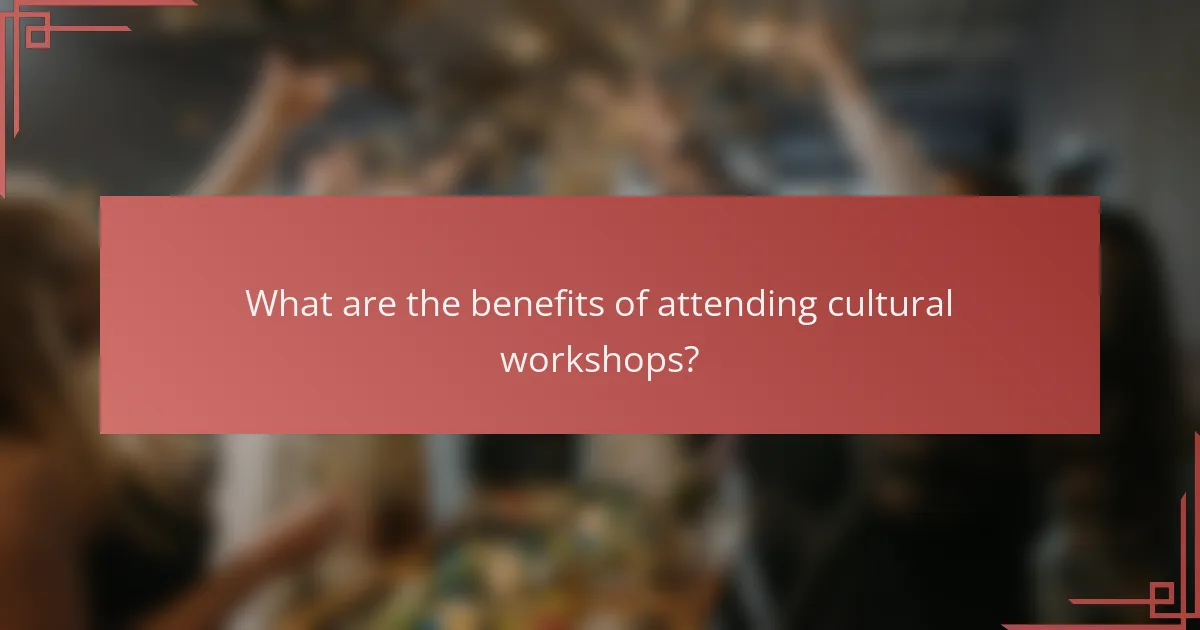
What are the benefits of attending cultural workshops?
Attending cultural workshops offers numerous advantages, including enhanced learning and personal growth through direct engagement with local customs and practices. Participants gain valuable skills while fostering connections with others who share similar interests.
Hands-on learning experiences
Hands-on learning experiences in cultural workshops allow participants to actively engage with the material, making the learning process more effective and enjoyable. For example, cooking classes in Thailand teach participants how to prepare traditional dishes using local ingredients, providing a deeper understanding of the culture.
These workshops often include practical activities, such as crafting, dance, or music, which help reinforce the skills being taught. Engaging directly with the culture enhances retention and appreciation of the knowledge gained.
Networking opportunities
Cultural workshops create excellent networking opportunities for individuals looking to connect with like-minded people. Participants can meet local artisans, chefs, and performers, as well as fellow attendees from around the world, fostering a sense of community.
Building relationships during these workshops can lead to future collaborations, friendships, or even professional opportunities. Engaging with others who share your interests can enrich your experience and expand your horizons.
Immersion in local traditions
Immersion in local traditions is a key benefit of attending cultural workshops, as they provide an authentic glimpse into the customs and practices of a region. Participants often learn about the history and significance behind various cultural elements, enhancing their appreciation for the local way of life.
For instance, participating in a festival workshop in India may involve learning traditional dance forms, which not only teaches the art but also connects participants to the cultural heritage of the community. This immersive experience fosters a deeper understanding and respect for the culture being explored.

What should you consider when choosing a festival to attend?
When selecting a festival to attend in Asia, consider factors such as accessibility, cultural significance, and the availability of workshops. These elements will help ensure a rewarding experience that aligns with your interests and logistical needs.
Location accessibility
Accessibility is crucial when choosing a festival, as it affects your travel plans and overall experience. Look for festivals that are well-connected by public transportation or have convenient accommodation options nearby. Consider the distance from major airports or train stations, and check if local transportation is reliable.
Additionally, evaluate the festival’s location in terms of safety and comfort. Some regions may have language barriers or cultural differences that could impact your experience. Researching the area beforehand can help you feel more at ease during your visit.
Cultural significance
Understanding the cultural significance of a festival can enhance your appreciation of the event. Festivals often celebrate local traditions, historical events, or religious practices, providing insight into the community’s values and heritage. Research the festival’s background to grasp its importance and the customs involved.
Participating in culturally significant festivals can also offer unique experiences, such as traditional performances, local cuisine, and artisan crafts. Engaging with the local community during these events fosters a deeper connection and understanding of the culture.
Workshop availability
Workshops at festivals can provide hands-on learning experiences that enrich your visit. Check if the festival offers workshops related to your interests, such as cooking, crafts, or performing arts. These sessions often allow for interaction with skilled artisans and can be a highlight of your trip.
Consider the duration and cost of workshops, as they can vary widely. Some may be included in the festival ticket, while others might require an additional fee. Early registration is often recommended, as popular workshops can fill up quickly.
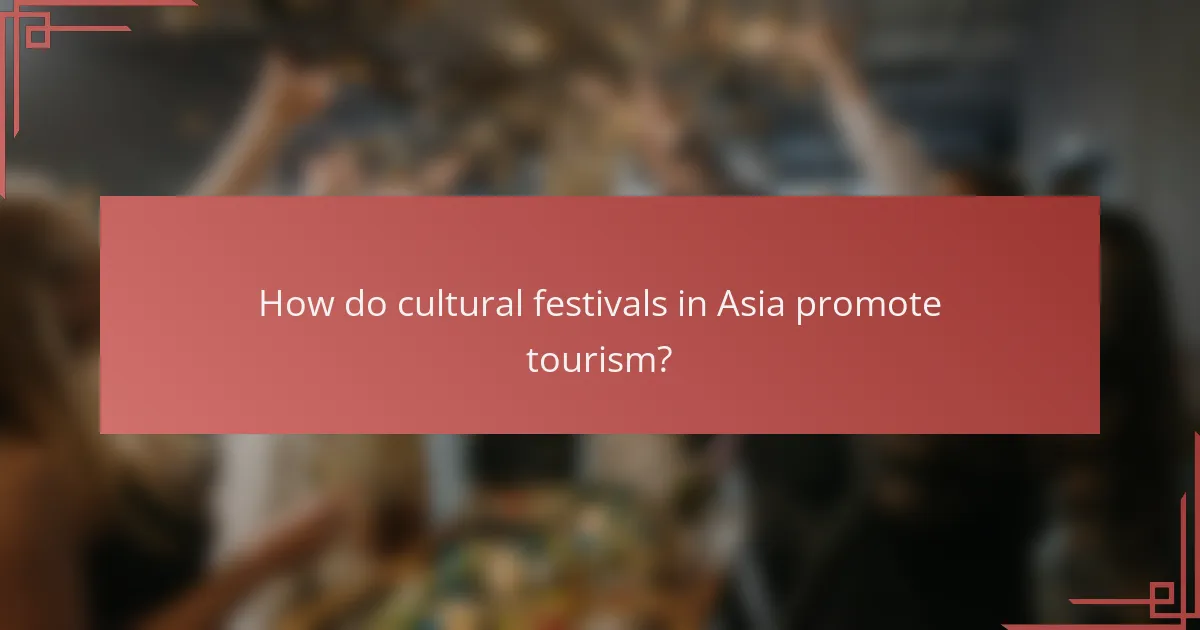
How do cultural festivals in Asia promote tourism?
Cultural festivals in Asia significantly enhance tourism by attracting visitors, showcasing unique heritage, and stimulating local economies. These events create vibrant experiences that draw both international and domestic travelers, fostering a deeper appreciation for local traditions.
Attracting international visitors
Cultural festivals serve as a magnet for international tourists, offering them a chance to experience authentic local customs and traditions. Events like the Holi festival in India or the Lantern Festival in Taiwan draw thousands of visitors each year, providing a unique opportunity for cultural exchange.
Marketing strategies, such as social media campaigns and partnerships with travel agencies, can further amplify the reach of these festivals. Engaging content that highlights the festival’s unique aspects can entice potential visitors to plan their trips around these events.
Showcasing local heritage
Festivals are a platform for showcasing local heritage, including traditional music, dance, and cuisine. For example, the Gion Matsuri in Japan features elaborate floats and traditional performances that celebrate the region’s history and culture.
By presenting local customs in an engaging manner, festivals help preserve cultural identity while educating visitors. This not only enriches the tourist experience but also fosters pride among local communities in their heritage.
Boosting local economies
Cultural festivals can significantly boost local economies by increasing spending in various sectors, including hospitality, food, and retail. Local businesses often see a surge in sales during these events, as tourists seek accommodations, meals, and souvenirs.
Moreover, festivals can create temporary jobs and stimulate long-term economic growth by attracting repeat visitors. Communities can maximize these benefits by ensuring adequate infrastructure and services to accommodate the influx of tourists, thus enhancing the overall experience.
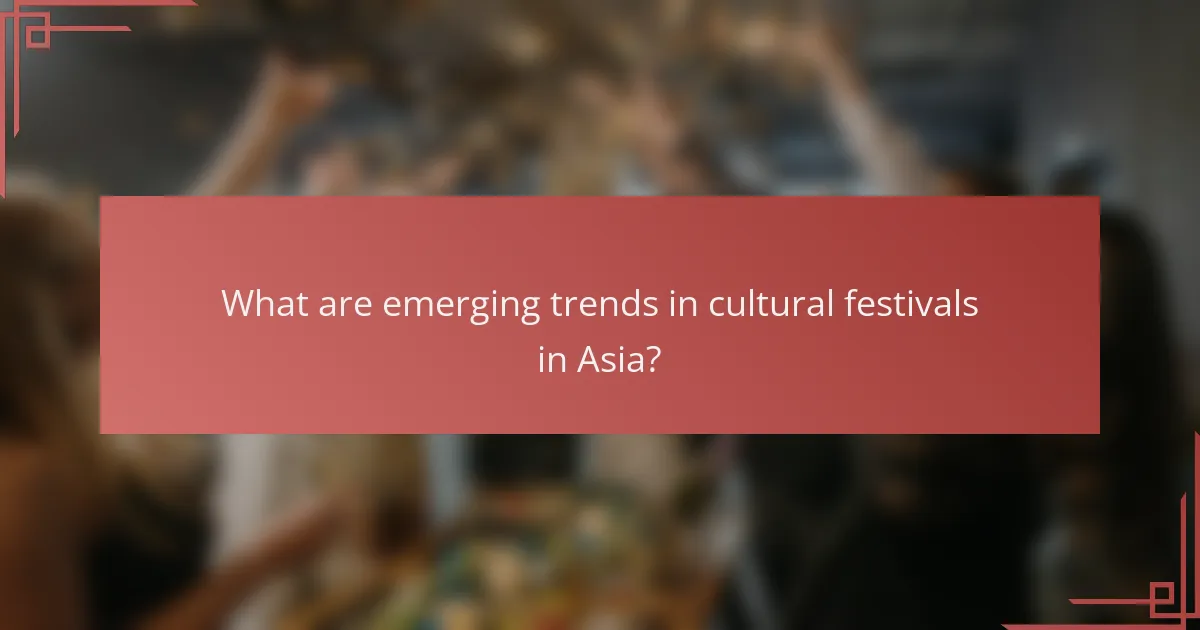
What are emerging trends in cultural festivals in Asia?
Emerging trends in cultural festivals in Asia reflect a growing emphasis on sustainability, inclusivity, and the integration of technology. Festivals are increasingly showcasing local traditions while adapting to modern influences, attracting diverse audiences and fostering community engagement.
Increased Focus on Sustainability
Many cultural festivals in Asia are adopting sustainable practices to minimize their environmental impact. This includes using eco-friendly materials, reducing waste, and promoting local artisans. For example, festivals in countries like Thailand and Indonesia are encouraging the use of biodegradable products and offering recycling stations.
Organizers are also emphasizing local food sourcing to support regional economies and reduce carbon footprints. Attendees are often encouraged to participate in sustainability initiatives, such as tree planting or clean-up drives, enhancing their connection to the festival and its community.
Integration of Technology
Technology is playing a significant role in transforming cultural festivals across Asia. Many events are utilizing mobile apps for ticketing, scheduling, and interactive experiences, making it easier for attendees to navigate the festivities. Virtual reality and augmented reality are also being incorporated to enhance engagement and provide immersive experiences.
Social media platforms are increasingly used for promotion and real-time updates, allowing festivals to reach wider audiences. This trend not only boosts attendance but also creates a sense of community among participants, as they share their experiences online.
Emphasis on Inclusivity
Inclusivity is becoming a key focus for cultural festivals in Asia, with many events striving to be accessible to diverse audiences. This includes offering programs that cater to different age groups, cultural backgrounds, and abilities. For instance, some festivals provide sign language interpreters and sensory-friendly spaces to accommodate individuals with disabilities.
Additionally, festivals are highlighting underrepresented cultures and traditions, fostering a sense of belonging and appreciation among attendees. This shift not only enriches the festival experience but also promotes cultural understanding and unity within communities.
